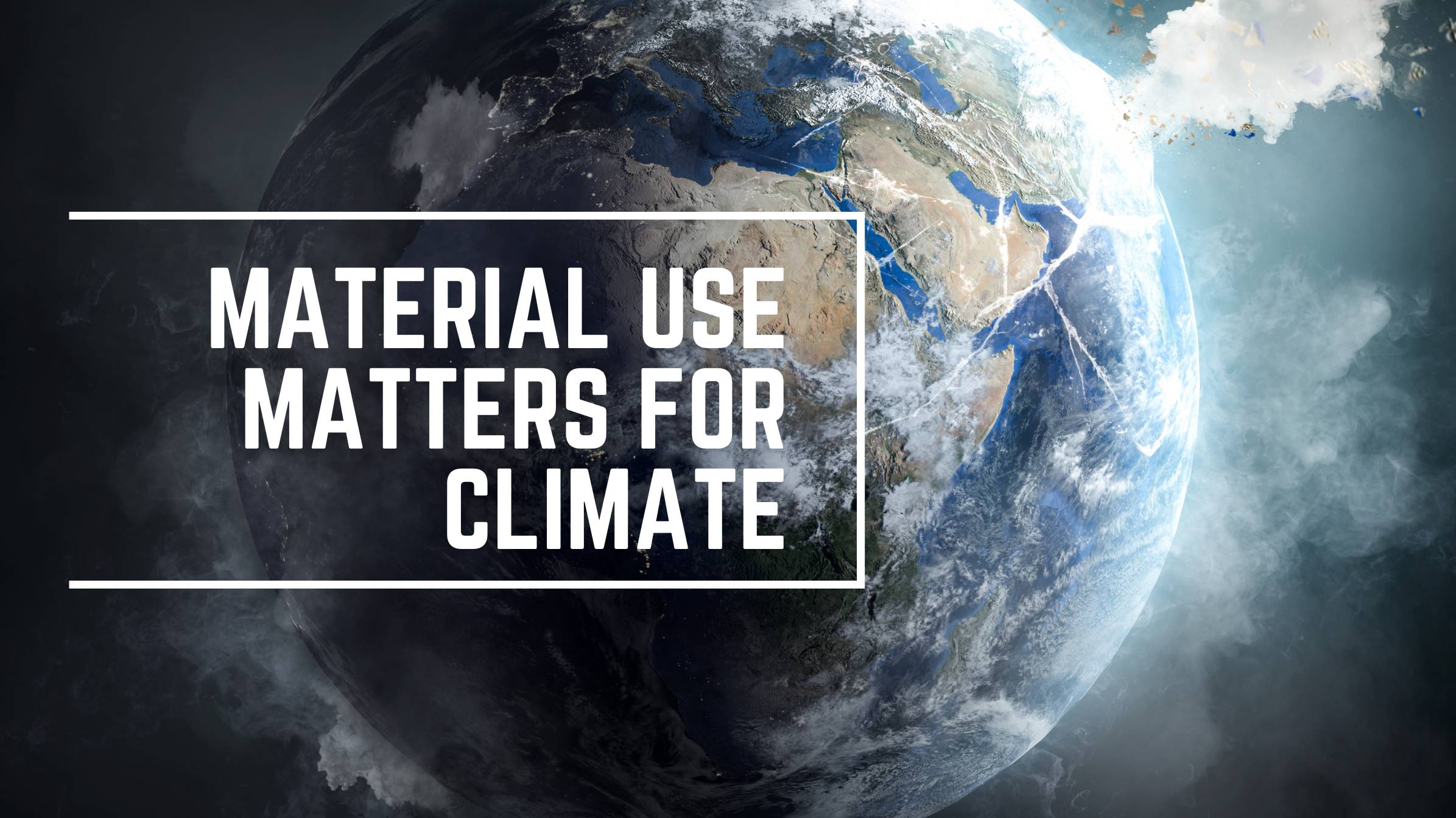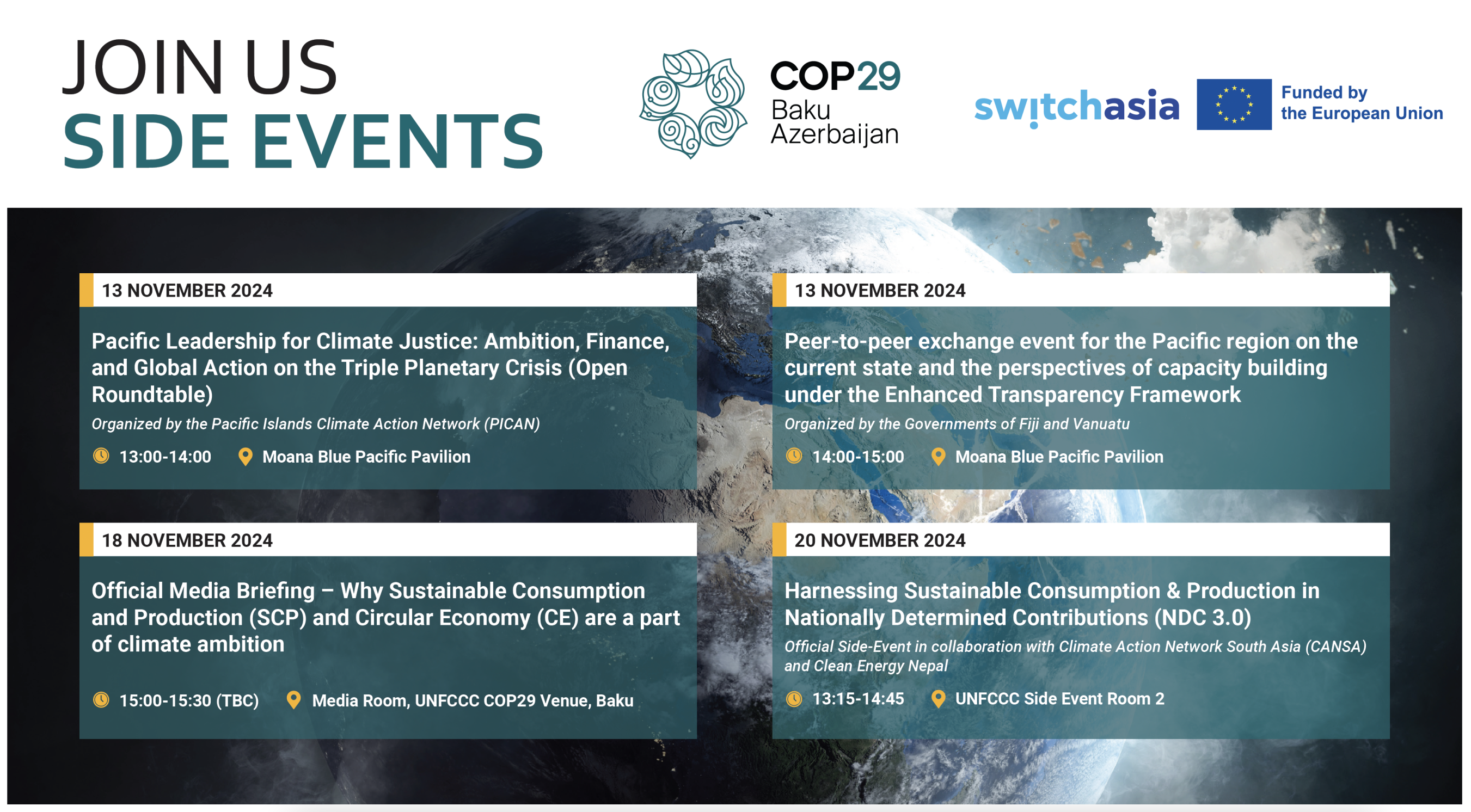
The SWITCH-Asia programme has been actively working across various sub-regions within the Asia-Pacific, aiming to incorporate SCP and CE principles into NDC 3.0 and Long-term Low Emission Development Strategies (LT-LEDS). Through targeted Technical Advisories (TAs), SWITCH-Asia supports countries in the region to enhance their climate action by embedding these sustainable practices into their Nationally Determined Contributions (NDCs). As part of its commitment to advancing these priorities, the programme will participate in the upcoming UNFCCC COP29, a global platform where countries gather to discuss and advance climate action. This engagement offers a strategic opportunity for the programme to align its efforts with global climate goals, synergize with other stakeholders, and amplify its influence on enhancing climate ambitions through SCP and CE initiatives.
During COP29, SWITCH-Asia will be organizing and participating in a series of events, roundtables, and high-level discussions, focusing on the integration of SCP and CE as critical drivers of climate ambition. These engagements will also provide a space for countries to share experiences and perspectives, contributing valuable insights to the ongoing global discourse on NDC 3.0. The programme’s involvement aims to support nations in defining and refining strategies, offering practical guidance, and helping align national contributions to the goals of the Paris Agreement.

UNFCCC COP29: An Essential Forum for Global Climate Action Amidst the Triple Planetary Crisis
This week marks the beginning of the 29th Conference of the Parties (COP29) under the United Nations Framework Convention on Climate Change (UNFCCC), where global leaders, policymakers, scientists, and environmental advocates will gather for two weeks of intense discussions and negotiations. This important conference is aimed at advancing global climate action, with deliberations often extending beyond the official timeline of two weeks as the complexities of climate issues demand exhaustive discussion. UNFCCC COP29 is a crucial juncture in an unprecedented series of global environmental summits, following closely on the heels of the 16th Conference of the Parties (COP16) to the Convention on Biological Diversity (CBD) in Cali, Colombia, and preceding the 5th session of the Intergovernmental Negotiating Committee (INC-5) on plastic pollution, to be held in Busan, South Korea. Together, these conferences emphasize the interconnected nature of today’s environmental challenges, stressing the collective responsibility to address the triple planetary crisis of climate change, biodiversity loss, and pollution.
Addressing the Triple Planetary Crisis
Although COP29 will primarily focus on climate change, the integration of biodiversity and pollution issues within the broader context of climate action has never been more important. The recent CBD COP16 emphasized the need to accelerate implementation of the Global Biodiversity Framework, a vital agenda for safeguarding ecosystems and species. Meanwhile, the upcoming INC-5 on plastic pollution will tackle another facet of environmental degradation: pollution and waste management, essential to reducing harm to ecosystems and communities worldwide. Each of these agendas point back to the overarching need for a livable and sustainable planet, a goal that connects cross-disciplinary actions and synergized efforts across policy areas.
NDC 3.0 in UNFCCC COP29 agenda
At the forefront of COP29’s agenda will be discussions on climate finance, particularly the establishment of a New Collective Quantified Goal (NCQG). Building on the current $100 billion goal, the NCQG aims to significantly bolster funding, supporting both mitigation and adaptation efforts in developing nations. This goal is interlinked with several key agenda items, including the Global Stocktake (GST) and guidance for the next generation of Nationally Determined Contributions (NDCs) — known as NDC 3.0.
NDCs form the backbone of the Paris Agreement, with each country voluntarily setting climate targets based on national priorities, and updating these every five years. With the deadline for NDC 3.0 submissions approaching in 2025, countries are already engaging in preparations for this critical cycle. To inform this process, the GST is assessing collective progress in achieving existing NDCs, allowing nations to evaluate successes and identify areas for improvement.
The GST process has spurred the release of several crucial scientific reports, including the Intergovernmental Panel on Climate Change’s (IPCC) Sixth Assessment Report, UNEP’s Emissions Gap Report 2024, the Intergovernmental Resources Panel’s (IRP) Global Resources Outlook 2024, and multiple documents on the Global Plastic Treaty under the INC process. These reports reiterate urgent messages:
- The global community faces an increasingly narrow and challenging path to avert irreversible environmental damage — a path that demands bold, unprecedented action.
- All possible opportunities for impactful climate action must be utilized, given the severity of the triple planetary crisis.
Leveraging the Material Resource-Climate Nexus
One of the least explored areas in climate action is the relationship between material resource use and climate change. The IRP’s Global Resources Outlook 2024 highlights that more than 60% of global emissions are tied to the extraction, production, and utilization of material resources. This trend is on the rise, highlighting the need for increased efficiency in resource use to achieve net-zero, climate change adaptation and resilience building. COP29 offers an opportunity to address this gap by encouraging countries to integrate Sustainable Consumption and Production (SCP) practices and Circular Economy (CE) principles into their climate commitments, especially as they prepare NDC 3.0.
Incorporating SCP and CE strategies could significantly enhance resource efficiency, reduce emissions, enhance adapationa efforts, and lessen the overall environmental impact of production and consumption patterns. By embedding these principles in the NDC framework, countries can pursue a comprehensive approach to climate action that not only reduces emissions but also promotes sustainable economic growth and resilience.


